At the historic first EU-Moldova Summit in Chișinău, a pivotal moment unfolded as leaders from both sides gathered to deepen their cooperation. President of the European Commission Ursula von der Leyen, alongside President of the European Council António Costa and President of the Republic of Moldova Maia Sandu, set the stage for a new chapter in their relationship.
The summit was not just about diplomatic talks; it was about building a bridge between nations for a brighter future. Discussions centered around various key areas such as EU accession, economic reforms, security partnerships, and defense collaboration to counter hybrid threats. These dialogues were not merely political maneuvers but signals of a commitment to progress and prosperity.
President von der Leyen’s announcement of releasing €270 million as part of the €1.9 billion EU Growth Plan for Moldova marked a significant stride towards bolstering the country’s infrastructure and economy. This financial infusion is not just numbers on paper; it signifies tangible improvements in Moldovan lives – from a new Bălți Regional Hospital to enhanced heating systems in Chișinău, ultimately resulting in reduced utility bills for citizens.
The Growth Plan goes beyond monetary support; it symbolizes a shared vision for development encompassing better roads, modern schools, advanced healthcare facilities, thriving small businesses, and preservation of Moldovan culture. It is an investment not only in infrastructure but also in the well-being and aspirations of the Moldovan people.
As President von der Leyen unveiled plans for cheaper euro bank transfers through Moldova’s inclusion in SEPA by October 2025 and proposed integration into the EU Roaming area by January 2026, she opened doors to increased connectivity between Moldova and its European counterparts. The ‘Roam Like at Home’ initiative holds promises of seamless communication across borders without roaming charges – a gesture that transcends physical boundaries to foster stronger ties.
Amidst discussions on economic growth and connectivity lay crucial deliberations on security challenges faced by Moldova. The specter of hybrid and cyber-attacks orchestrated by Russia loomed large ahead of Moldova’s upcoming parliamentary election. The leaders underscored the need to fortify defenses against such threats while emphasizing clear communication on the benefits of EU integration.
Expert voices echoed sentiments of optimism interwoven with caution regarding this deepening partnership between the EU and Moldova. Dr. Sofia Ivanov, an international relations scholar remarked,
“The strides taken at this summit reflect a promising trajectory towards closer collaboration; however, navigating geopolitical complexities demands vigilance.”
The backdrop against which these developments unfold paints a picture of evolving EU-Moldova relations reaching unprecedented heights. From attaining candidate status in June 2022 to initiating accession negotiations in December 2023, Moldova has been steadfastly advancing towards its European aspirations.
The €1.9 billion EU Growth Plan stands as a beacon guiding this journey towards economic stability and eventual EU membership. It represents more than just financial aid; it embodies solidarity and belief in Moldova’s potential to thrive within the European framework.
As dusk fell on Chișinău after an eventful summit day filled with promises and commitments, one thing became clear – what transpired within those walls was not just diplomacy; it was a testament to shared values driving two entities towards common goals.

